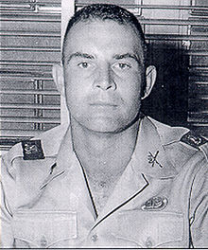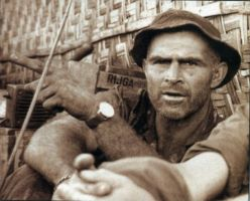
 |
|
|
||
|
Charles Alvin Beckwith 'Chargin' Charlie' |
||||
|
Engagements: • Korean War (1950 - 1953)• Vietnam War (1960 - 1973) |
||||
| Biography: | ||||
|
Charles Alvin Beckwith Charles Alvin Beckwith was born on 22 January 1929 in Atlanta, GA. He was a standout football player at Brown High School. He later enrolled in the University of Georgia where he was an All-State Football player and three-year starting guard for the University of Georgia Bulldogs. He was a member of the Delta Chapter of the Sigma Chi Fraternity. He joined the University's Army Reserve Officers' Training Corps program and was commissioned as a Second Lieutenant in 1952. He was drafted by the Green Bay Packers in 1952, but turned it down to stay in the Army. After the Korean War, in 1953-54, Second Lieutenant Beckwith served as a Platoon Leader for Charlie Company, 17th Infantry Regiment, 7th Infantry Division in the Republic of Korea. In 1955, Beckwith joined the 82nd Airborne Division as Commander of a Support Company in the 504th Infantry Regiment. Two years later, after completing Ranger School, Beckwith transferred to the Army Special Forces and, in 1960, was deployed to South Vietnam and Laos as a Military Advisor. Beckwith served as an exchange officer in the British Special Air Service (22 SAS Regiment) in 1962, where he picked up many of their capabilities. He served in war-time guerilla operations with the SAS during the Malayan Emergency. In the jungle, he contracted leptospirosis that was so bad doctors didn't expect him to survive. Within months, he fully recovered. Upon his return from England, Beckwith presented a detailed report outlining the Army's vulnerability in not having an SAS direct action-type unit. For several years, Beckwith (then a Captain) submitted and re-submitted the report to Army brass, only to be repeatedly thwarted in his efforts. Special Forces leadership, at the time, thought that they had enough on their hands and didn't need the bother of creating a completely new unit. Meanwhile, as the 7th Special Forces Group's Operations Officer, Beckwith went to work revolutionizing Green Beret training. At the time, Special Forces focused on unconventional warfare, and especially foreign internal defense: i.e. training indigenous personnel in resistance activities. But Beckwith recognized that, "Before a Special Forces Green Beret soldier could become a good unconventional solder, he'd first have to be a good conventional one... Because I had commanded rifle and weapons companies, I was appalled on arriving in Special Forces to find officers who had never commanded conventional units." Beckwith restructured the 7th's training, basically rewriting the book on American special ops training from the real-world lessons he had learned with the SAS. Beckwith had also learned that a symbol of excellence, like a beret, had to be earned. Officers were being assigned to Special Forces straight out of War College with no prior special ops experience and were given their Green Beret on arrival. The hard-nosed and practical training standards that Beckwith instituted would lend themselves to the birth of the modern Q-Course. In Vietnam, Beckwith Commanded a Special Forces unit code-named Project DELTA. He was critically wounded in early 1966 (he took a .50 caliber bullet through his abdomen), so badly that medical personnel initially triaged him as beyond help. After recovery, he took over the Florida Phase of the U.S. Army's Ranger School, transforming it from a scripted exercise based upon the Army's World War II experience, into a Vietnam-oriented training regimen. In 1968, following the Tet Offensive, Lieutenant Colonel Beckwith returned to Vietnam, taking Command of the 2nd Battalion, 327th Infantry (Airborne), 1st Brigade, 101st Airborne Division. For the nine months that he commanded the 2/327 ("No Slack"), they saw many successes in combat operations, including: Huế, Operation Mingo, Operation Jeb Stuart, Operation Nevada Eagle (clearing the Huế-Phu Bai area), and Somerset Plain (sweeping the southern portion of the A Shau Valley). The toughest job the battalion had was clearing a seven kilometer stretch along Route 547, running west of Huế; eventually defeating the determined North Vietnamese Army defenders so that Fire Support Base Bastogne could be established. After Vietnam, Beckwith was stationed at Fort Bragg, NC, where he commanded training operations. Delta Force Although Beckwith had presented proposals throughout the 1960's for a superbly elite, highly autonomous direct-action unit, the idea had sat on the shelf for a decade. Finally, in the mid-70's, as the threat of international terrorism became imminent, Beckwith was tapped to form his unit. Delta Force was founded in November 1977 as a counter-terrorist unit whose main mission is in hostage rescue, covert operations, and specialized reconnaissance. Its first mission (Operation Eagle Claw, to rescue the U.S. Embassy hostages in Iran) was aborted due to aviation failures which led to several deaths. After the "debacle in the desert" the 160th Special Operations Aviation Regiment was formed to provide transport for Delta Force and other special operations units. Joint Special Operations Command ('JSOC') was also formed, directly based on Beckwith's recommendations during Senate investigations into the mission's failure. Following his disappointment at the failure of the Iranian operation, Beckwith retired from the Army in 1981. Medals and Awards Distinguished Service Cross In Retirement After retiring, he formed a consulting firm, Security Assistance Services. In 1983, he wrote a book, "Delta Force" with Donald Knox, in which he blamed the helicopters and their Marine Corps pilots for the failure of the rescue mission. An innovative thinker and creative soldier, his concept of a counter-terrorist force was seen as years ahead of its time. Personal Charles and his wife, Katherine, had three daughters. Death and Burial Colonel Charles Alvin Beckwith died on 13 June 1994 at his home in Austin, TX, of natural causes. He is buried at the Fort Sam Houston National Cemetery in San Antonio, TX. |
||||
| Honoree ID: 2234 | Created by: MHOH | |||
Ribbons
Medals
Badges
Honoree Photos
 |  |  |
 |  |
 |


